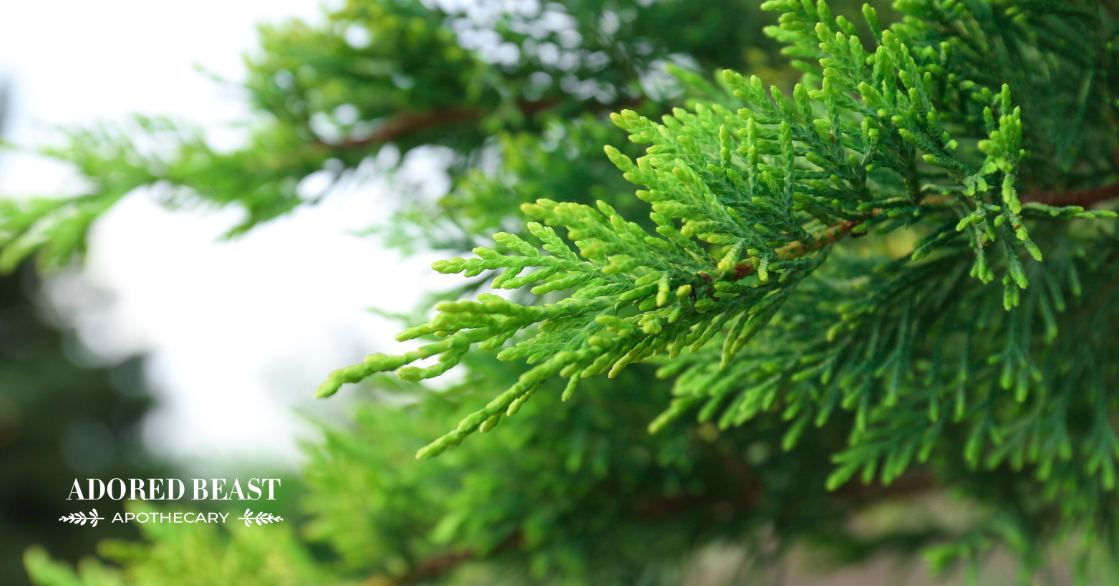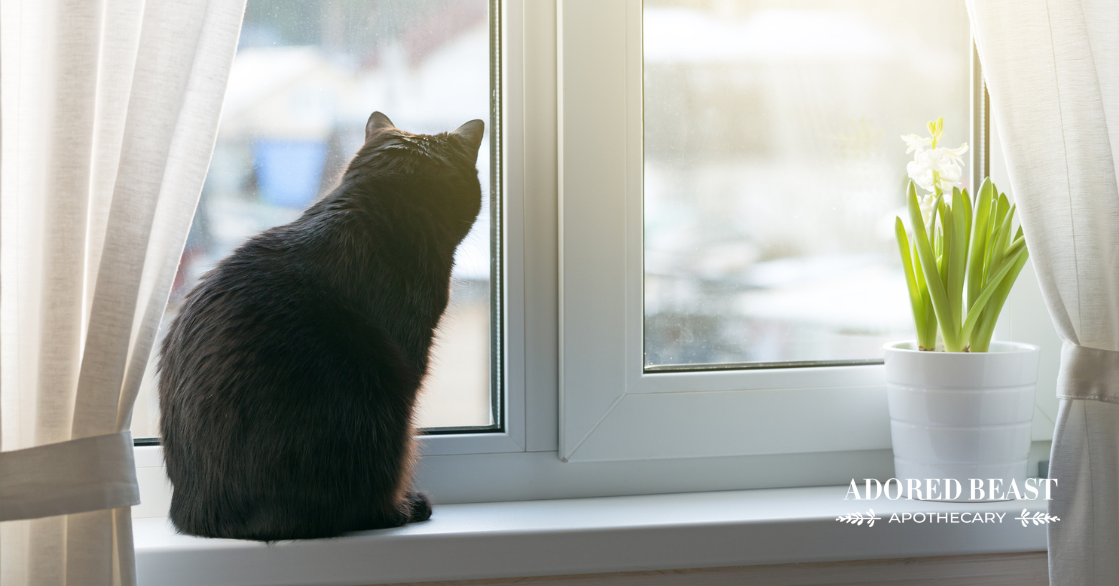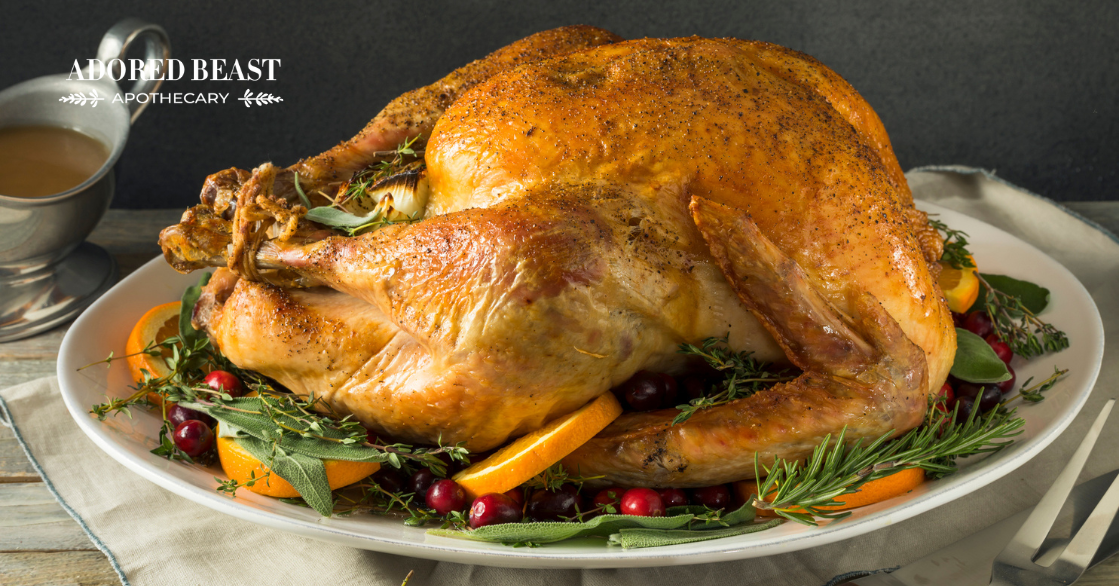As a homeopath, our founder, Julie Anne Lee, DCH, is always considering the ways that homeopathic remedies can contribute to the health and wellness of our animals. Homeopathy features in a lot of what we do at Adored Beast, from considering formulations to education.
Because of its effectiveness and its ability to complement so many other treatment modalities, it comes as no surprise that homeopathy is really growing in popularity.
And that means there’s a growing awareness of the different remedies available and how each one supports the body in various ways.
Every so often, we like to pick out one of those remedies and feature it, so today, we’re celebrating homeopathic Thuja for pets and all it has to offer!
What is Thuja?
Thuja (Thuja occidentalis), commonly known as arbor vitae or white cedar, is a plant remedy that comes from fresh green twigs of the northern white cedar. Arbor vitae – the latin name for the tree – literally means “Tree of Life”. The white cedar is indigenous to eastern North America and is grown in Europe and Brazil as an ornamental tree.
Indigenous peoples of Canada first identified the healing properties of Thuja as a remedy by native Indians in Canada and was found to prove effective in the treatment of weakness from scurvy.
In traditional medicine, indicate it for liver diseases, bullous bronchitis, psoriasis, enuresis, amenorrhea, cystitis, uterine carcinomas, diarrhea, and rheumatism. The chemical constituents of Thuja have been of research interest for decades, due to their contents of essential oil, coumarins, flavonoids, tannins, and proanthocyanidines. And the beneficial properties are numerous: antioxidant, anti-inflammatory, antibacterial, antifungal, anticancer, antiviral, and protective activity of the gastrointestinal tract.
Originating from Samuel Hahnemann’s principles in the late 18th century, homeopathy emphasizes the use of highly diluted substances to stimulate the body’s innate healing mechanisms. The idea is that a remedy mimics a disease state, which can help stimulate the body to initiate its own natural healing processes.
Remedies are made by diluting them to minute numbers. Not once, not twice, but thousands of times. For example, Thuja 30C has been diluted 3000 times! A stronger potency, 1M for example, is even more diluted. In fact, with homeopathy, the smaller the crude substance, the bigger the benefits.
[RELATED] Homeopathic Remedies for Cat and Dog Dental Health
Homeopathic Thuja for Pets
Homeopaths choose homeopathic Thuja for pets to address various physical symptoms. This remedy primarily acts on the mucus membrane of the genitourinary tract, gastrointestinal tract, on the skin, glands, blood, mind, and brain.
Here are a few of the things Thuja for pets is often indicated for:
- Vaccinosis: By far, our most favourite use for Thuja is to combat the ill effects of over-vaccination. Without removing the benefits of vaccines, Thuja helps to address the negative side effects. (That’s why it’s in our Rebalancer!)
- Respiratory issues: Thuja works on the mucous membranes in the respiratory tract, so it’s often reach for for concerns like bronchitis, swelling or inflammation of the tonsils, even for the common cold.
- Lumps and Bumps: We often reach for Thuja when there are lumps, bumps, warts, or growths on the skin. These are often a symptom of a build up of toxins in the body, and they’re the body’s way of “pushing” those toxins out.
- An Over-active Brain: In humans, Thuja is often indicated for disorders of the brain, such as dementia or even psychosis. When there’s too much activity, and the brain is over stimulated, you want to try and balance it out. For animals, it’s much the same.
- Sarcoids or Proud Flesh: For all you horse people out there, Thuja is often a remedy for proud flesh and sarcoids.
When we think of Thuja, we think “too much.” That’s why we like it for warts, or for an over-active brain, or after vaccines. When there’s too much happening in the body, it expresses it, typically in a negative way, and Thuja helps to “calm” or express that overabundance.
How to Use Thuja for Pets
You can find homeopathic Thuja for pets (it’s the same as for humans) online or at your local health food shop. It comes in a variety of different potencies. For those new to homeopathy, go with a 30C potency and look for the remedy in pellet form.
First things first – and this is important. Homeopathy is not like a drug. The amount isn’t based on weight, and it doesn’t matter if your animal has 2 pellets or 6. Again, hard to wrap your head around this one, but it’s just the way it works. As long as some of the remedy gets into your pet, the energy of the remedy will be able to get to work.
If your animal will take the pellets without issue by mouth, that’s an easy way to do it. They even have this perfect little pocket just inside their cheek that you can pop the remedy into. For cats, or pickier dogs, this might not be the easiest option. In this case, stir a few pellets into a small cup of water and give the water to your animal. That works too.
**Whenever you give a remedy, try not to touch the pellet with your fingers, and try not to touch the container to your pet’s mouth. If the container comes in contact with your animal’s mouth, wash it with hot, soapy water and make sure it dries completely.
Give the remedy and watch for any signs of improvement. If, after 30 minutes or so, you haven’t noticed a change, give it again. If, after that, you’re still not seeing a change, perhaps try a different remedy.
Homeopathic Thuja for pets offers a gentle and effective approach to supporting the health and well-being of our animals. Even if you just have it to clear our the effects of over-vaccination, it can incredible valuable. With its origins rooted in natural healing principles, Thuja can address a wide range of physical and emotional symptoms in pets, promoting internal balance, harmony, and vitality.












